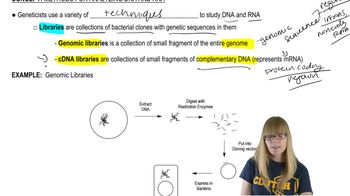Table of contents
- 1. Introduction to Genetics51m
- 2. Mendel's Laws of Inheritance3h 37m
- 3. Extensions to Mendelian Inheritance2h 41m
- 4. Genetic Mapping and Linkage2h 28m
- 5. Genetics of Bacteria and Viruses1h 21m
- 6. Chromosomal Variation1h 48m
- 7. DNA and Chromosome Structure56m
- 8. DNA Replication1h 10m
- 9. Mitosis and Meiosis1h 34m
- 10. Transcription1h 0m
- 11. Translation58m
- 12. Gene Regulation in Prokaryotes1h 19m
- 13. Gene Regulation in Eukaryotes44m
- 14. Genetic Control of Development44m
- 15. Genomes and Genomics1h 50m
- 16. Transposable Elements47m
- 17. Mutation, Repair, and Recombination1h 6m
- 18. Molecular Genetic Tools19m
- 19. Cancer Genetics29m
- 20. Quantitative Genetics1h 26m
- 21. Population Genetics50m
- 22. Evolutionary Genetics29m
18. Molecular Genetic Tools
Methods for Analyzing DNA
Problem 20
Textbook Question
Would you have your genome sequenced, if the price was affordable? Why or why not? If you answered yes, would you make your genome sequence publicly available? How might such information be misused?
 Verified step by step guidance
Verified step by step guidance1
<insert step 1> Consider the potential benefits of having your genome sequenced, such as gaining insights into your genetic predispositions to certain health conditions, which can help in making informed lifestyle and healthcare decisions.>
<insert step 2> Reflect on the ethical and privacy implications of having your genome sequenced, including who will have access to your genetic information and how it might be used.>
<insert step 3> Evaluate the potential risks of making your genome sequence publicly available, such as discrimination by employers or insurance companies based on genetic information.>
<insert step 4> Consider the broader societal implications of widespread genome sequencing, including how it might contribute to scientific research and personalized medicine.>
<insert step 5> Weigh the personal and societal pros and cons to make an informed decision about whether you would have your genome sequenced and whether you would make it publicly available.>
Recommended similar problem, with video answer:
 Verified Solution
Verified SolutionThis video solution was recommended by our tutors as helpful for the problem above
Video duration:
2mPlay a video:
Was this helpful?
Key Concepts
Here are the essential concepts you must grasp in order to answer the question correctly.
Genomic Sequencing
Genomic sequencing is the process of determining the complete DNA sequence of an organism's genome. This includes identifying the order of nucleotides in the DNA, which can provide insights into genetic predispositions to diseases, traits, and ancestry. As technology advances, the cost of sequencing has decreased, making it more accessible to individuals.
Recommended video:
Guided course

Sequencing Difficulties
Privacy and Ethical Considerations
The decision to have one's genome sequenced raises significant privacy and ethical concerns. Personal genetic information can reveal sensitive data about health risks and familial relationships. There is a risk of misuse, such as discrimination by employers or insurance companies, and the potential for unauthorized access to genetic data, which can lead to ethical dilemmas regarding consent and ownership.
Recommended video:
Guided course

Mapping with Markers
Public Availability of Genetic Data
Making genomic data publicly available can contribute to scientific research and advancements in medicine, but it also poses risks. Public access can lead to the potential misuse of genetic information, including stigmatization or exploitation of individuals based on their genetic traits. Balancing the benefits of sharing data for research with the need for individual privacy is a critical issue in the field of genetics.
Recommended video:
Guided course

Modern Genetics

 7:40m
7:40mWatch next
Master Methods for Analyzing DNA and RNA with a bite sized video explanation from Kylia Goodner
Start learningRelated Videos
Related Practice


